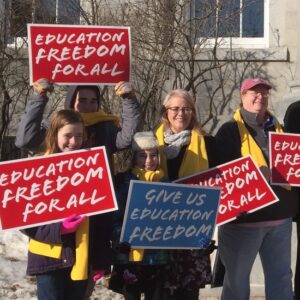Consistent with our New Hampshire values, Children’s Scholarship Fund (CSF) operates the state’s Education Freedom Account (EFA) program with extreme transparency, accountability, and attention to detail so Granite State families can be empowered to choose the education that best meets their children’s needs, while taxpayer dollars are used as efficiently and effectively as possible.
We have been utterly confounded by recent discussions in the New Hampshire legislature in which one legislator referred to the EFA program as a “black box.” In fact, the opposite is true. Far from lacking oversight, the EFA program has received accolades for its integrity, and CSF recently underwent an annual independent risk-based program audit that confirms our error-free effectiveness.
I would love to share in detail how we report on the EFA program to the state so you can see for yourself.
First, all students participating in the EFA program must have a State Assigned Student Identifier (SASID) for student enrollment tracking and grant payment purposes. Each September, CSF must provide data to the NH Education Department (NHED) for each student using an EFA through a Beginning of Year (BOY) Report. NHED also requires CSF to submit an Anytime of Year (AOY) Report four times during the school year to keep student enrollment data current.
At the end of each school year, CSF must recap enrollment data for the NHED through yet another report called, you guessed it, the End of Year (EOY) Report. Students who graduate or withdraw from the program are reconciled in the EOY, and CSF returns the unused EFA funds to the NHED. Funds are reconciled to the penny so that not even one cent of taxpayer money is misused.
Once a family receives an EFA grant, it is deposited into a restricted-use account, or digital wallet, called ClassWallet. ClassWallet is an approval-based system, which prevents the need for parents to make out-of-pocket expenditures and provides for maximum program integrity. Every time an EFA parent or guardian initiates a transaction, such as uploading a tuition invoice or putting an item in a cart through the online marketplace, the transaction is inspected and either approved or denied by a member of CSF’s compliance team, according to the allowable use of funds categories outlined in the EFA law. Additionally, our Director of Compliance performs a second internal review of 100 transactions or more monthly. EFA Educational Expense Reports are provided by CSF to the NHED annually in extensive detail, organized by vendor and by allowable use categories. You can see an example on the NHED’s website here.
In addition to the reporting detailed above, CSF is required by law to report cases of suspected fraud to the NHED and Attorney General’s Office. CSF also aggregates EFA recipient test scores annually and reports them to NHED, and surveys EFA families to measure their satisfaction.
Recently, you may have heard some debate about whether or not the Legislative Budget Assistant (LBA), a state agency separate from the NHED, can audit the tax returns that families provide to qualify to participate in the EFA program. While we appreciate a good debate, this one is not necessary, because both EFA law and the state-approved contract already require CSF to undergo a risk-based program audit annually.
This year’s audit, performed by Grant Thornton, a respected independent public accounting firm, found no concerns, misuse, or misstatements. The audit can be viewed on CSF’s website here, and our 990 federal tax return documents are also available on our website.
CSF has a 4-star Charity Navigator rating – the highest possible rating – and also the highest possible score that a nonprofit can attain for accountability and transparency. And this January, the EFA program was cited by EdChoice, a national education nonprofit, for the “most effective implementation” of an educational choice program in the country. In its praise, EdChoice noted that the program has grown rapidly “while preserving the highest level of program accountability and integrity.” EdChoice highlighted the level of detail involved in overseeing EFAs as unusual, adding, “While reviewing every single transaction may be more challenging in larger states, it’s clear that New Hampshire’s success in implementing the Education Freedom Account program is a model for states across the nation.”
In short, New Hampshire’s EFA program is the opposite of a “black box.” It provides comprehensive safeguards against fraud and abuse while protecting student and parent autonomy and privacy. Most importantly, EFAs make all schools directly accountable to parents. If a school is not meeting parents’ standards, EFAs empower parents to choose another education option – whether public, private, independent or homeschool. All New Hampshire families should have the power to get the education that is best suited to their children’s unique learning needs – in the New Hampshire way – with extreme transparency, accountability, and attention to detail.





